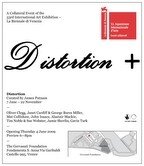Distortion
dal 3/6/2009 al 21/11/2009
Segnalato da
Janet Cardiff
George Bures Miller
Oliver Clegg
Mat Collishaw
John Isaacs
Alastair Mackie
Tim Noble
Sue Webster
Jamie Shovlin
Gavin Turk
James Putnam
3/6/2009
Distortion
Gervasuti Foundation, Venezia
Il progetto intende in parte celebrare la tradizione dei grandi pittori vedutisti veneziani del XVI secolo. L'effetto di distorsione d'altronde, coinvolge i processi percettivi dell'immagine e dipende dai cambiamenti che il soggetto subisce trasformandosi in un oggetto estetico. La mostra e' a cura di James Putnam, artisti: Janet Cardiff & George Bures Miller, Oliver Clegg, Mat Collishaw, John Isaacs, Alastair Mackie, Tim Noble & Sue Webster, Jamie Shovlin e Gavin Turk.

curated by James Putnam
Oliver Clegg, Janet Cardiff & George Bures Miller,
Mat Collishaw, John Isaacs, Alastair Mackie,
Tim Noble & Sue Webster, Jamie Shovlin, Gavin Turk
Distortion has been a significant feature of creative expression throughout the history
of art. In his notebooks, Leonardo da Vinci described a bizarre use of perspective to
create an anamorphosis, a deliberately distorted image almost unrecognisable at first
sight but when viewed from a certain angle turns to a normal appearance. Staged in
Venice, this project is intended in part to celebrate the tradition of the great 16th
century Venetian painters, like Jacopo Tintoretto (1518-1594) who used distortion
to achieve dramatic effect. Distortion affects the perception of an image and depends
upon the changes that the thing undergoes in the process of becoming an aesthetic
object. It can combine elements of both the comic and grotesque in stylistic distortions of the human form – strangely disproportioned figures and the expressive
deformation of particular features. Rather than making an image ‘worse’ it merely
represents a change in the original image’s information. This alteration can be more
pleasing to human perception than if the image was ‘perfectly’ regular. In the genre
of rock music much of its’ appreciation relies on ‘beauty’ of guitar distortion achieved
by overdriven valve amps and fuzz pedals.
Distortion is due to the fact that abstractions from the norm are both made,
and seen. It can be either formal or emotional, and presupposes an order from which
to deviate, and in representation it must have a recognisable reference to the norm,
such as a distorted circle. While the artist’s mind strives for compositional symmetry
and harmony, it also has a penchant for creating imbalance and distortion. Distortion
expresses both the strength and the vulnerability of the human psyche. It also repre-
sents a transgressive form of creativity that evokes a darker view of the world or the
universal anxieties that affect the human condition. It has been used intentionally for
expressive and emotional ends in contemporary art where not only figures, but also
objects, scale and space can be distorted. One of its most significant aspects that now
affect our daily lives is the distortion of the ‘truth’ by the media and the manipulation
of digital images.
Previously regarded as being merely a form of mannered exaggeration or
an imaginative conceit, distortion was thought to be an abnormal, minor aspect of
artistic output. But in our contemporary culture, it has become increasingly evident
that distortion is something important and vital to all creative expression.
For further details and images please contact James Putnam:
james@jamesputnam.org.uk, +44 (0)7952 682530
Supported by: Arts Council of England, Gervasuti Foundation, Haunch of Venison, All Visual Arts, Gagosian Gallery, Next Media,
Blacks Club London, The Drawbridge Magazine, Hotel Metropole Venezia, Bersi Serlini Franciacorta, MISA.
Press office: Laura Bellucci
Head of Communication & PR Tel. +39.349.8163272 laura@gervasutifoundation.com
Opening June 4 h 6-8pm
H 10p.m. performance "The Art of ironing" by Gabriella Daris
Gervasuti Foundation
Fondamenta S. Anna (Via Garibaldi) Castello 995, Venice
The Foundation is situated at the north end of Via Garibaldi
Vaporetto stop: Giardini (lines No.1 & 82)



